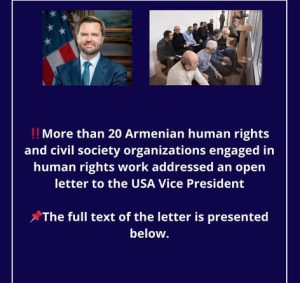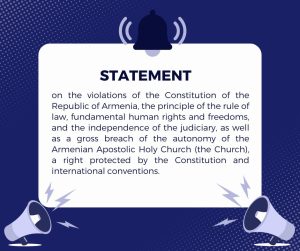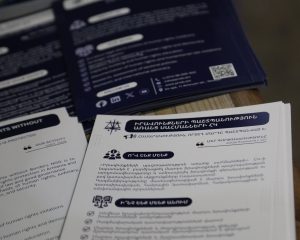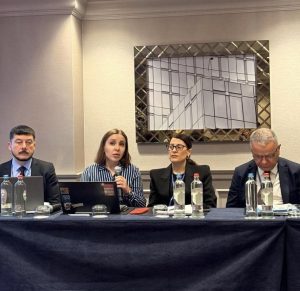
Open Letter from Armenian Human Rights NGOs to U.S. Vice President J.D. Vance on the Issue of Armenian Prisoners
On the eve of U.S. Vice President JD Vance’s visit
Yerevan, 18 October 2025
We, the undersigned civil society organizations and experts, strongly condemn the recent manifestations of selective, punitive, disproportionate, and unlawful use of criminal justice mechanisms in Armenia, which are accompanied by gross violations of fundamental human rights.
The instances where criminal legal instruments are applied based on political expediency with the aim of restricting the right to freedom of speech, including through the use of pre-trial detention are of particular concern.
Although under international legal standards, the right to freedom of speech is not absolute and may be subject to certain restrictions, such measures must be lawful, legitimate, and proportionate—necessary in a democratic society. In a democratic society, restriction of harsh, offensive, or otherwise unlawful speech and the use of punishment for that through criminal legal mechanisms could not be considered legitimate and proportionate. Such actions are punitive in nature and serve as a clear message to a broader public to silence opposing, critical, and undesirable voices.
On 16 October 2025, reports emerged that attorney Aleksandr Kochubayev had been arrested and charged under Article 490 of the Criminal Code of the Republic of Armenia (Publicizing defamatory information or information otherwise damaging the rights and lawful interests of a judge, a prosecutor or an investigator) for a post made on the social media platform Facebook. A video circulated on the same platform shows that the arrest of the attorney was accompanied by the use of unnecessary force, including being thrown to the ground, thereby degrading his dignity and presumably punishing him for his post. Moreover, a two-month pre-trial detention was imposed on the attorney as a preventive measure.
The use of criminal justice tools and the harshest form of preventive measure in response to an online post, even if it contains offensive language, constitutes an unlawful and disproportionate interference with individual rights.
Attempts to restrict offensive speech through criminal legal tools have been previously occurred in Armenia as well. It is worth recalling that the current Armenian authorities had, years ago, criminalized insult, which was met with widespread criticism from both Armenian human rights organizations and international bodies. As a result, insult was decriminalized in line with international legal standards.
However, even after the decriminalization of insult, we continue to witness attempts to apply other articles of the Criminal Code, ones that are not adequate to the act, in cases involving offensive speech.
The state has an obligation to restrict speech that incites violence or promotes hatred. However, speech containing incitement to violence may be restricted through criminal legal mechanisms only if there is a substantiated real possibility that the violence occurs. In such cases, any interference and punishment must be proportionate. A disproportionate punishment renders such interference arbitrary.
One example of such arbitrariness is the criminal prosecution of Archbishop Mikael Adjapahyan under Article 422 (2) of the Criminal Code of the Republic of Armenia (public calls to seizure of power or violent overthrow of the constitutional order), his pre-trial detention, and sentencing to imprisonment for his speech. This took place under circumstances where the same speech had previously been assessed by law enforcement bodies as not constituting a criminal offense, and criminal legal tools were applied to the fullest extent amid tense relations between the Armenian authorities and the Armenian Apostolic Church.
Moreover, the unprecedented speed of the pre-trial and especially the judicial proceedings in this criminal case, along with the imposition of imprisonment as a sentence, highlight a tendency to use criminal justice against Archbishop Adjapahyan based on political expediency. Analysis of judicial practice in Armenia shows that in other cases initiated on similar grounds, proceedings took considerably longer, and no individual found guilty of similar conduct has actually served prison term. In most cases, non-custodial penalties were applied.
Similar concerns arise in the case of Samvel Karapetyan, where criminal prosecution under Article 422 of the Criminal Code appears to be based solely on assumptions and following instructions driven by apparent political motives, along with his continued detention.
It is noteworthy that since 2020, there has been a sharp increase in the initiation of criminal cases on the grounds of calls to overthrow the government, including for posts made on social media.
Cases have also been initiated under Article 329 of the Criminal Code of the Republic of Armenia, which penalizes public speech aimed at inciting or promoting hatred, discrimination, intolerance, or enmity, as well as the dissemination of materials or objects for such purposes. While the criminalization of such speech is intended to protect the rights and freedoms of others, it is critically important to ensure the accurate qualification of the speech and to avoid arbitrary or selective enforcement—particularly based on political expediency.
Another egregious example of unlawful interference with the right to freedom of expression is the detention of Arsen Ghukasyan, the uncle of a serviceman missing since the 2020 Artsakh war. His detention appears to aim at suppressing his right to express protest and participate in public assemblies, and more broadly, at discouraging the families of other missing servicemen from exercising their legitimate right to voice criticism and demand accountability from the authorities. Furthermore, Arsen Ghukasyan reportedly suffers from medical conditions incompatible with detention, which further underscores the unlawfulness of his pre-trial detention.
In such circumstances, the instrumentalization of criminal justice based on political expediency is extremely concerning. Moreover, a review of the practice of applying pre-trial detention as a preventive measure reveals a pattern of abuse—often imposed without sufficient, individualized, and evidence-based justification. This practice is persistent and systemic, distorting the principle of the rule of law and undermining the institutional integrity and independence of the criminal justice system. It also erodes public trust in the judiciary as the guarantor of human rights protection.
In light of the above, we demand the following:
Protection of Rights without Borders NGO
Helsinki Citizens’ Assembly Armenian Committee
Armenian Progressive Youth NGO
Public Journalism Club NGO
Center for Law and Liberty NGO
Regional Center for Democracy and Security
Yerevan Press Club
Helsinki Association human rights NGO
Journalists for Human Rights NGO
MITK NGO
Isabella Sargsyan, Expert on Freedom of Religion or Belief

On the eve of U.S. Vice President JD Vance’s visit

We, the undersigned civil society organisations and individuals, express our

The Protection of Rights Without Borders team participated in the

On December 4, Hasmik Harutyunyan, Legal Expert at the Protection